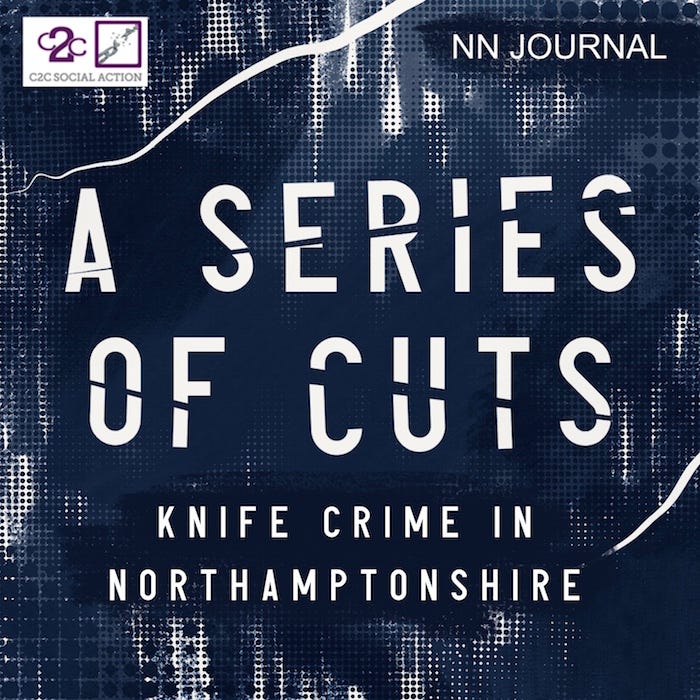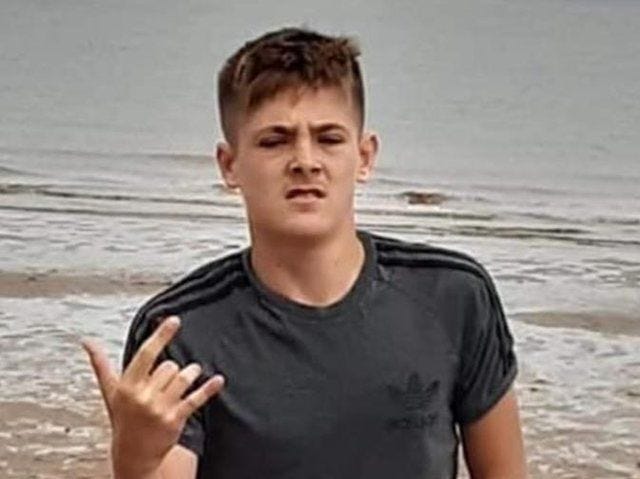Editorial: Northamptonshire's knife crime problem needs real action
Lives are being destroyed in some of the county's communities
For most people in Northamptonshire, knife crime is something that affects other people but for some communities in our county it is an issue that blights lives.
When NN Journal started our levelling up project looking at the lives of people living in Northamptonshire’s five ‘left behind’ areas, something we repeatedly heard was that knife crime was a growing concern for both adults and children.
When we were asked to produce a podcast to coincide with the visit of the Knife Angel to the area this month, we knew that some of those places would feature heavily in our work. Even so, despite being aware of the issue and reporting on incidents involving knives, we were shocked by the extent of the problem.
In Kings Heath in Northampton, primary school children as young as six are talking about people being stabbed outside their homes. Parents have been advised to collect their year five and six pupils after school - who in most other schools would be given the opportunity to walk home alone - because so many of them have expressed their fears about local gangs. And even teachers are told not to leave the site alone at night.
The headteacher Kim Duff says she has had to pause the usual curriculum three times in the last year so that the school could discuss knife incidents which have happened in the area. A local gang is so active in Kings Heath that she has had to tell pupils to run if they see a suspected or known gang member approach them and has contacted the police to ask for more support.
“I wrote that letter to the police force to put the request in, I have noticed a shift in the accessibility I now have to the local PCSO who will come into school…but I would still like to see more police presence on the Heath at certain times of day,” the headteacher said.
On the day NN Journal visited Kings Heath Primary Academy, an 11 year-old boy told us that earlier that week he had followed his headteacher’s advice after being attacked in the nearby park. He said that while he was on the ground he thought to himself that he needed to run, and managed to get away and reach the safety of a friend’s house.
In Kingswood in Corby, 10 and 11 year-olds spoke passionately about the need for more police in their area. They had all heard of local knife incidents, with some witnessing an air ambulance taking a victim to hospital, and others knowing people involved in attacks.
“My sister’s friend got stabbed in the town a few months ago…he was up town with his girlfriend and he got stabbed seven times I think, while being kicked in the head,” one year six pupil said.
And in Queensway in Wellingborough we were told about drug dealers hanging around outside schools and secondary aged pupils being expelled only to then be picked up and groomed by county lines gangs.
One teenage girl told us it was common for young people to brag about carrying knives in school and that all her friends knew about the local gang operating in the area.
It is perhaps no coincidence then that two 16 year-old boys killed in our county in separate incidents last summer were also from ‘left behind’ areas, Dylan Holliday in Queensway and Rayon Pennycook in Kingswood. Today is the first anniversary of Rayon’s death.
In a bleak reminder of how urgent the need is to tackle the problem, just last Saturday, an 18 year-old boy, was taken to hospital after being stabbed in the Queensway area.
Our podcast A Series of Cuts looks at the impact a decade of austerity has had on these areas in terms of knife crime. Cuts to youth services, police and other services have hit the poorest communities hardest. A lack of facilities, youth clubs and not enough support for families has left too many young people vulnerable to gangs. As one councillor said to us ‘the five year-olds we failed then are now running around with knives’.
The deaths of Dylan and Rayon prompted a response from their local communities with people coming together to call for an end to the violence and doing what they can to raise awareness about the issue. Marches have been organised, community meetings have been held and events have taken place in schools and youth clubs. But they can’t do it alone.
What struck us throughout the process of making the podcast, is the varying political response to the issues surrounding knife crime in our county. In the north of the county there has been much more of a focus due to the work of a committee set up to look at ‘left behind’ areas. In the west, the issues in areas such as Kings Heath have barely been discussed.
We also checked the contributions made in parliament on the issue from Northamptonshire’s MPs. Hansard records show that despite teenagers being killed and injured on our streets just one ( Kettering’s Philip Hollobone) has raised the issue of knife crime in the House of Commons at all in the last five years.
The visit of the Knife Angel has helped to put knife crime back on the political agenda but it is not enough for our politicians to attend events and praise the work of community groups. The extent of the problem in these areas must be acknowledged and real action must be taken. It will take a lot of listening to communities, the sharing of intelligence and proper funding of services but most importantly it will require the political will to really change things.




There will be no solution to knife crime until there is a long hard look at drugs policy. The illegality of drugs, and the lucrative industry around it, is fueling drug gangs and the inevitable violence that follows. Calls for more police and increased use of stop and search are failed responses. They create a false sense of security, affect the innocent and create even more fear and distrust. Solutions rest with eliminating the source of the gangs money - the illegal drugs trade - and resourcing genuine grass roots community initiatives, not more resources and powers to the police.